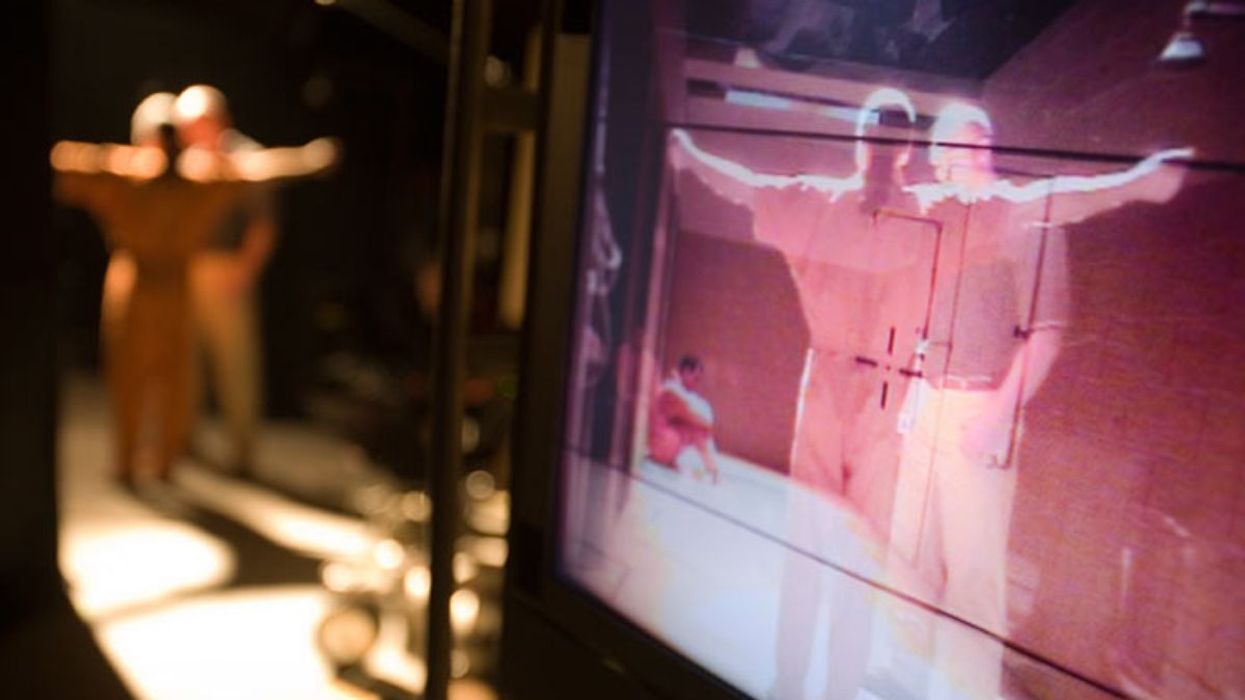Errol Morris on Why VR is 'Like a Crime Scene' and Other Meditations on Reality
Errol Morris gets interactive and questions the nature of reality— virtual and otherwise.

International Documentary Film Festival Amsterdam (IDFA) is not only known as Europe’s most prestigious documentary showcase, but also as an advocate and exhibitor of new forms of nonfiction storytelling. As such, it holds an interactive conference, which last year was designed around a central question: how do we redefine physical space and the art of documentary storytelling in the digital age?
An impressive array of boundary-pushing artists and practitioners set out to answer that query, such as Dima Gharbawi and Reem Haddad, whose interactive doc Life on Hold explores the Lebanese refugee crisis, and Amy Rose and May Abdalla from Anagram, who have moved from creating films to “immersive storytelling experiences,” and whose beautiful project Door into the Dark won Tribeca Storyscapes in 2015.
“Art is constantly extending what is permissible, what’s imaginable...what you can do, as opposed to what you are supposed to do.”
And then there was someone on stage who might not be a usual suspect when it comes to discussing interactive docs: Academy Award-winning filmmaker Errol Morris, director of such classics as Fast, Cheap & Out of Control and The Thin Blue Line. For those of us who weren’t lucky enough to be in the gorgeous Dutch city for the festivities, IDFA has now released many of the fascinating talks online. We delved into Morris’ talk, moderated by Jason Spingarn-Koff of Netflix, in which the filmmaker made the case that documentary and virtual reality aren’t all that different.
Both film and VR are like a crime scene
Morris’ film Standard Operating Procedure, about the infamous Abu Ghraib photographs, was made into an interactive exhibit of the same name. (Note that you need Flash 9 to view the work.) In discussing the film, Morris said, “One of the things that I’ve been trying to do, and one of the things that VR may be trying to do, is to provide context. I made this film because I saw all of these photographs—some of the most widely distributed in history. They were endlessly shown, but no one had bothered to talk to the people who took the photographs.”
Because he sees every photograph as a piece of reality that is torn away from its context, Morris described the making of the film as “like as a crime scene. You’re constantly in the process of trying to figure it out from all of the available evidence around you. In my own small way, in creating the context of these photographs...I was doing some species of virtual reality.” He admitted that "maybe I’m all wrong about [virtual reality], but I think that’s part of it. Trying to reconstruct the context of things.”
Later in the talk, Morris revealed why this metaphor is so appropriate for him: he was a New York City detective for three years.
Documentary format is constantly being reinvented
Long before the emergence of VR, and even the web, the doc format was in flux. Morris, who has been making documentaries for almost 40 years, said, “I ask myself, ‘Do I still like documentary?’ I think the answer is yes because it’s still not clear to me what it is. The fact that I’m trying to figure that out keeps me at the enterprise, at least for a little while longer.”
Morris reminisced about how much the field has grown during his career in terms of practitioners and style, adding, “Art is constantly extending what is permissible, what’s imaginable, what you can do, as opposed to what you are supposed to do.”
“I took all the rules and I did the exact opposite.”
Reality is already virtual
Morris got passionate when discussing the evolving field and his own predilection for rule-breaking. He remembered making his first film, Gates of Heaven, in 1978: “I knew there were all of these documentary rules about how you were supposed to make documentaries. Use available light; don’t you dare light anything. Be as unobtrusive as possible. Don’t arrange things, leave everything as you found it.”
Morris knew the rules, but he wasn’t having it. He knew that, no matter how much of a fly-on-the-wall a filmmaker is supposed to be, “everything is a reenactment.” He went on to make a pretty bold statement: “Here’s your ultimate virtual reality concept. Reality is a reenactment of what’s out there, inside of our heads.”
So, what was Morris’ reaction to this revelation? “I took all the rules and I did the exact opposite.” The film went on to wide acclaim (Roger Ebert named it one of the 10 best films ever made) and, as Springarn-Koff pointed out, many of Morris’ early innovations have now become conventions of the form.

'Non-linear’ stories might not be a thing
Despite his willingness to think outside the box, Morris does draw a line in one area. “I think stories are linear," he said. "Go ahead, kill me."
Referencing a David Hume theory, Morris explained, “We tend to see causality in the world...and this need to see a ‘before’ and ‘after’ in how we explain the world around us is part of who we are. It’s part of our brains. We see the world as linear stories.”
However, that doesn’t mean Morris is anti-VR. Instead, he told the audience: “What strikes me as interesting about virtual reality is not that it’s non-linear, if it even is. It’s that you’re allowed to look at context. To think of images in different ways.”
Top article photo credit: 'Standard Operating Procedure,' dir. Errol Morris


 'Tombstone'Credit: Disney
'Tombstone'Credit: Disney










